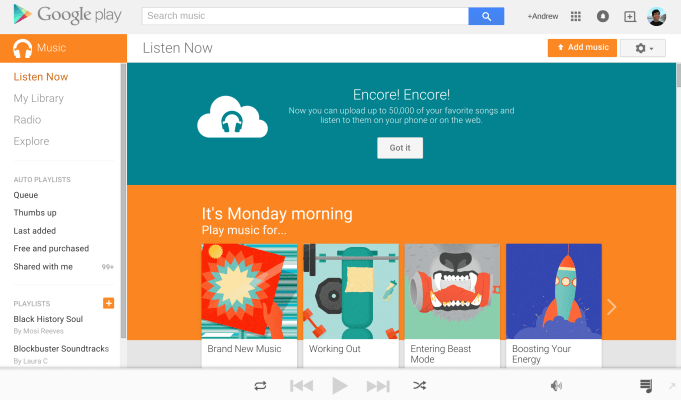Google has bumped the storage limit for its locker service for Google Play Music from 20,000 to 50,000 songs, giving users more than double the capacity to store their own collection in the cloud, over and above the extensive streaming library that makes up Google Play Music’s own category. The extended library allowance is a free upgrade for users, meaning people get the additional capacity without having to sign up for more Drive storage or anything like that.
The bump in available space is easy to take advantage of, and applies automatically if you’re already hosting your collection in Google’s cloud. If you haven’t yet used Google Play Music’s locker service, however, it’s pretty easy to get started, using the instructions provided by Google below:
- Sign in to Google Play Music with your Google account – Go to your computer and visit play.google.com/music. Sign up if needed.
- Claim your free storage – If you’d like to try the Google Play music subscription service too, click “Get Started”. Otherwise, click “No Thanks” to continue with the free storage.
- Add your music collection – The setup process will guide you through adding the Chrome app*, which provides seamless uploading. You can choose to simply upload your entire iTunes library or select other music folders. You can upload 50,000 songs for free.
- Access your music at any time on multiple devices – You can stream or download music to your Android, iPhone, or iPad for easy offline listening. It’s also all available on the web when you’re on your computer. And when you upgrade to a new computer or the latest mobile device, your music comes along too. You’ll never be without your favorite artists again!
*Not using Chrome? The setup process at step 3 will instead guide you through installing Music Manager where you can still add 50,000 songs.
While people are generally trending towards streaming services and away from downloaded digital files, according to most recent surveys and industry outlooks, there’s still a huge chunk of users that have invested in building massive local storage libraries. Google offering to take even bigger chunks of these legacy collections to the cloud is even more likely to help bring customers unwilling to give up their previous musical life altogether into their camp for the next stage of musical evolution.
